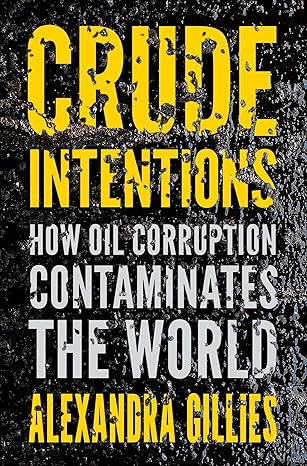
Billions of dollars stolen from citizens are circling the globe, enriching powerful individuals, altering political outcomes, and disadvantaging everyday people.
News headlines provide glimpses of how this corruption works and why it matters: President Trump's businesses struck deals with oligarchs and sold property to secretive shell companies; the Panama Papers leak triggered investigations in 79 countries; and, corruption scandals toppled heads of state in Brazil, South Africa, and South Korea. But how do these pieces fit together? And if the corruption is so vast and so tied up with powerful interests, how do we begin to fight back?
To find answers, Crude Intentions examines the corruption crisis that erupted during the recent oil boom. From 2008 to 2014, oil prices shot through the roof. Motivated by more than nine trillion dollars in new oil money, corruption followed apace. Examining the oil boom is like placing a drop of dye in the circulatory system of global corruption, and watching as it reveals the system's channels and pathways.
Company bosses signed off on risky schemes to snap up choice oil blocks. Politicians in Brazil and Nigeria stole billions to build up their election war chests. Kleptocrats in Angola, Azerbaijan, and Russia seized upon the oil wealth to cement their hold on power. And an army of bankers, accountants, and lawyers lined up to help these corrupt actors stash their loot in the global system of shell companies and tax havens that serves today's super-rich. The money then bought yachts, mansions, and even a few foreign politicians.
Drawing on information exposed by intrepid journalists, prosecutors, and whistle blowers, Crude Intentions tells jaw-dropping stories of corruption and asks what we can learn from them. The cases reveal common tactics, but also vulnerabilities in this web of fraud. These are the starting points for building a smarter fight against corruption, in the oil sector and well beyond.